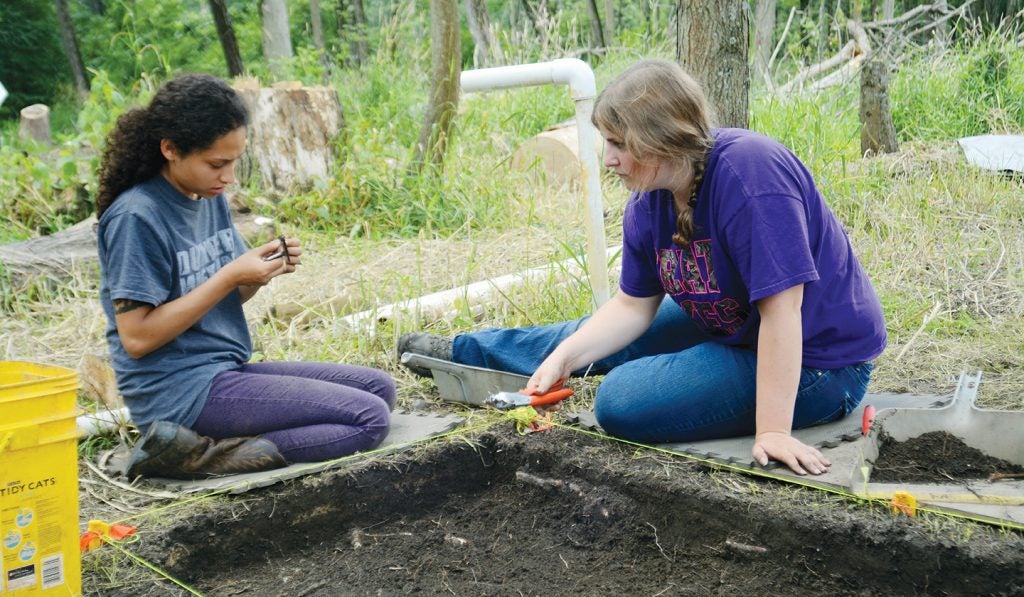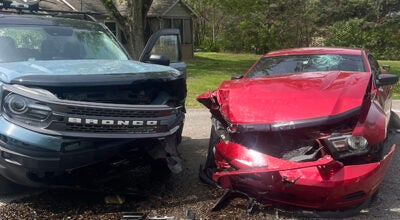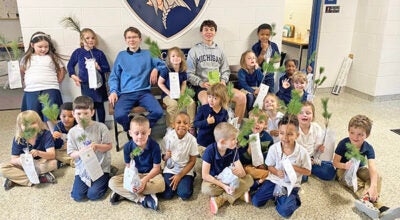Youth work with archaeologists to find artifacts at Fort St. Joseph
Published 12:40 pm Tuesday, July 18, 2017

- From the left, Western Michigan University students Crystal DeRoo and Morgan Powers examine a bone fragment that they found on site. (Leader photo/KELSEY HAMMON)
When Emily Fletcher was 13 years old, she spent a week digging in the dirt along the St. Joseph River, searching for historical artifacts through the Fort St. Joseph Archaeology Camp. Fletcher did not walk away empty handed.
“I got to hold artifacts in my hand and I used to think ‘somebody dropped this 300 years ago,’” Fletcher said. “It was a tangible link to history.”
Fletcher is now a senior at Kalamazoo College, where she studies history and computer science. This summer, she returned to the site of Fort St. Joseph to help teach youth about archaeology and history, while hoping to provide the experience she treasured when she was a teen.
The camp program for middle school students kicked off Monday with approximately a dozen enrolled. Niles youth had the opportunity to participate for free through a scholarship opportunity.
The excavation project began 19 years ago, through a partnership with the city of Niles and Western Michigan University. The dig site is located near the St. Joseph River south of the Riverfront Park boat launch off of Bond Street.
Archaeologist Tim Bober has worked on the site since 2008. Bober is also an education instructor with WMU and helps to lead the camps.
Those who participate start by learning about the fort’s history. Built in 1691 by the French and later occupied by the British, the fort would be a post for four different countries throughout its history. The fort would operate as a military garrison and trading post. When the post was abandoned, many clues to its history would sink in the mud surrounding the St. Joseph River, leaving a vast array of artifacts to be discovered. Those working at the site have uncovered more than 100,000 artifacts, since the project began, including musket balls, buttons, Jesuit rings, crucifixes, native pottery and the bones of animals, that were the remains of meals.
“Every one by one meter unit has thousands of artifacts,” Bober said. “It is just an amazing chance to teach and train professional archeologists and the public about what archeology is like. It is a chance to work in your backyard and see up close and personal the local history.”
For those who participate in the camp, a full archaeological experience is offered. Campers will research the area, help to search for artifacts and analyze the finds in a post excavation lab.
This year, Bober said he hopes to build upon what they found in years past.
For Fletcher, the experience inspired her to find a passion for history, which she is now studying in college. Additionally, Fletcher remembers how much she looked up to the college students working at the site. As she helps lead the camp this week, Fletcher said she hoped to inspire a similar passion for history.
“I hope they get the same thing I did out of it,” Fletcher said. “I also hope they have a lot of fun.”
Like Fletcher, several of the other college students helping to lead the excavation this summer are also former campers.
Miles Hostetler, 13, of Niles, said his home is close to the dig site. This is the first year he has attended, after being intrigued by the fort’s history.
“I just thought it would be quite the interesting opportunity for me, since I live right next to it and check it out,” Hostetler said.
Gretta Gardner, 13, of Kalamazoo, said her family frequently visits historical forts and dig sites. She said she felt the camp would be an enriching experience that would build upon what she had learned at those family outings.
Both said they hoped to find at least one historical artifact, while learning more from professionals.
“I am hoping to learn more about archaeology,” Gardner said. “I will probably [also] learn a lot more about Fort St. Joseph. I will probably learn a lot of things I never even thought I wanted to learn.”
Artifacts that are found are sent to WMU to be catalogued. Once recorded, the historical items are sent back to the Niles History Center.
The Fort St. Joseph Archaeology Camp offers two more camp session for high schoolers and adults. There are still spots available for next week’s camp. For more, or to apply visit Nileshistorycenter.org.
“I believe [the camp] is one of the most unique amazing, memorable, experiences,” Bober said. “I think it is something they will remember for the rest of their lives. They get to come out and work with real archaeologists.”






